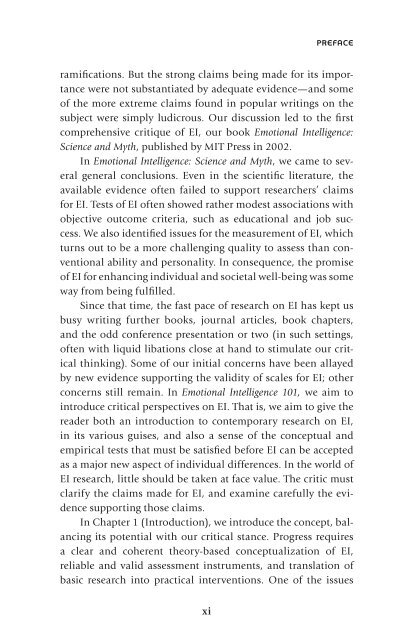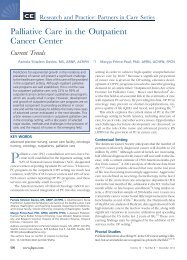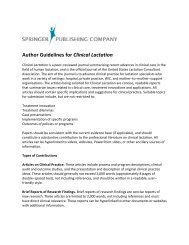Untitled - Springer Publishing
Untitled - Springer Publishing
Untitled - Springer Publishing
You also want an ePaper? Increase the reach of your titles
YUMPU automatically turns print PDFs into web optimized ePapers that Google loves.
PREFACE<br />
ramifications. But the strong claims being made for its importance<br />
were not substantiated by adequate evidence—and some<br />
of the more extreme claims found in popular writings on the<br />
subject were simply ludicrous. Our discussion led to the first<br />
comprehensive critique of EI, our book Emotional Intelligence:<br />
Science and Myth, published by MIT Press in 2002.<br />
In Emotional Intelligence: Science and Myth, we came to several<br />
general conclusions. Even in the scientific literature, the<br />
available evidence often failed to support researchers’ claims<br />
for EI. Tests of EI often showed rather modest associations with<br />
objective outcome criteria, such as educational and job success.<br />
We also identified issues for the measurement of EI, which<br />
turns out to be a more challenging quality to assess than conventional<br />
ability and personality. In consequence, the promise<br />
of EI for enhancing individual and societal well-being was some<br />
way from being fulfilled.<br />
Since that time, the fast pace of research on EI has kept us<br />
busy writing further books, journal articles, book chapters,<br />
and the odd conference presentation or two (in such settings,<br />
often with liquid libations close at hand to stimulate our critical<br />
thinking). Some of our initial concerns have been allayed<br />
by new evidence supporting the validity of scales for EI; other<br />
concerns still remain. In Emotional Intelligence 101, we aim to<br />
introduce critical perspectives on EI. That is, we aim to give the<br />
reader both an introduction to contemporary research on EI,<br />
in its various guises, and also a sense of the conceptual and<br />
empirical tests that must be satisfied before EI can be accepted<br />
as a major new aspect of individual differences. In the world of<br />
EI research, little should be taken at face value. The critic must<br />
clarify the claims made for EI, and examine carefully the evidence<br />
supporting those claims.<br />
In Chapter 1 (Introduction), we introduce the concept, balancing<br />
its potential with our critical stance. Progress requires<br />
a clear and coherent theory-based conceptualization of EI,<br />
reliable and valid assessment instruments, and translation of<br />
basic research into practical interventions. One of the issues<br />
xi<br />
Matthews_PTR_FM_12-10-11_i-xviii.indd xi<br />
10/12/2011 8:48:05 PM
















